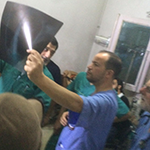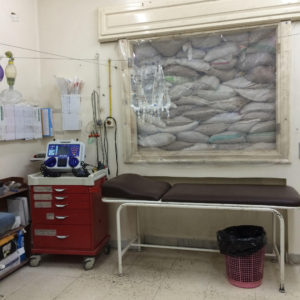 I received many emails after my last mission. One doctor emailed me to say that she was “horrified by what is happening in Syria” and she wanted to help by any means necessary. She felt that as a doctor she can do more than donate to relief organizations. One doctor wrote that she would love to go on a medical mission to Aleppo despite the risk to her life.
I received many emails after my last mission. One doctor emailed me to say that she was “horrified by what is happening in Syria” and she wanted to help by any means necessary. She felt that as a doctor she can do more than donate to relief organizations. One doctor wrote that she would love to go on a medical mission to Aleppo despite the risk to her life.
I believe that every life is precious. Every life should be treated the same. A patient in inner city Chicago deserves the same healthcare as any patient in the wealthiest suburb. The life of a child in Aleppo is as cherished as any life in Chicago. I go to medical missions because I believe in the power of volunteerism. We can’t wait for politicians to decide about no fly zones or no bombing zones. We can do our part. We can save many lives by doing what we do best, using our stethoscopes, skills, and compassion. We can use our collective voices to demand action. We have the moral high ground.
Doctors have responsibilities to stand up for their colleagues in Syria. It is not enough to sympathize and tweet about their ordeal. What is happening in Syria is setting a dangerous precedent, which threatens 150 years of progress since the First Geneva Convention. Doctors, nurses, ambulances, and hospitals should not be targeted by any entity during the time of war just because they are treating patients who are considered enemies by the culprits of these heinous attacks. Every attack on a hospital or a doctor is a war crime. We should support and advocate for our fallen colleagues in Syria and other conflict zones.
Attacks on healthcare facilities are now tolerated and considered the new normal in conflicts. I don’t see the outrage within the international medical community and medical associations. Shouldn’t we be outraged? How can we accept that President Assad, a person who has a medical degree, destroys the foundation of our Hippocratic oath? How can we accept that medical staff are being killed in Syria while they are trying to save the lives of their patients? How is it that we are not rushing to help our fallen colleagues in Syria? Why are we turning our backs on them?
 We can help by offering support so that medical supplies, ambulances, and life saving medications can be delivered across the border; training local doctors and nurses; setting up mobile clinics to reach displaced populations; and providing new and portable technologies, for example, portable ultrasounds, that can make the lives of these doctors easier. We can use telemedicine to connect besieged hospitals to specialists in the US. And above all, we can help by advocating on behalf of the doctors. We can be their voice to the medical community and policy makers.
We can help by offering support so that medical supplies, ambulances, and life saving medications can be delivered across the border; training local doctors and nurses; setting up mobile clinics to reach displaced populations; and providing new and portable technologies, for example, portable ultrasounds, that can make the lives of these doctors easier. We can use telemedicine to connect besieged hospitals to specialists in the US. And above all, we can help by advocating on behalf of the doctors. We can be their voice to the medical community and policy makers.
Charities and other organizations, such as the Syrian American Medical Society, have pioneered solutions to some of the resource gaps. These include portable ultrasounds and other point of care diagnostic tools, as well as virtual wards connecting nurses and doctors in besieged areas with specialists in the United States.
International medical organizations should advocate on behalf of their Syrian colleagues and champion an end to violations of international humanitarian law.
Educational opportunities to support Syrian health professionals, including scholarships for medical students, would help with ensuring there are enough staff to rebuild the Syrian health system.
There is a medical school for close to 300 Syrian medical students that is operating underground in and around Aleppo and other besieged areas, which is in much need of financial and technical support.
A consensus should be reached and acted upon by the international community on the urgent need to protect civilians from airstrikes and chemical attacks. This is needed to apply pressure to the Syrian government, and its allies Iran and Russia, so that they stop targeting the remaining healthcare staff and hospitals.
In the past day a nationwide ceasefire has begun and aid agencies are preparing to deliver food and medical supplies to Aleppo. Recently, I’ve joined leading doctors across the world to demand action to protect Syria’s hospitals. We reiterated a recent letter of 15 Aleppo doctors, who penned an open letter to US President Obama, in which they wrote that “Hospitals in eastern Aleppo are bombed almost daily, bringing utter devastation. We see pictures of small children with glazed looks in their eyes, a grainy paste of cement dust and blood streaking their faces. We watch videos of women and men wailing helplessly over the lifeless forms of their relatives. To those of us outside Syria, these are the nameless faces of this horrible war. But to Aleppo’s doctors, they are family, friends, and neighbors.” They demanded specific steps to protect their hospitals and their patients, writing “We do not need tears or sympathy or even prayers. We need action.”
When people ask me why I keep going back, I point to these exceptional Syrian doctors who work day and night, saving the lives of people in Aleppo.
See also: Practising medicine in Aleppo.
Zaher Sahloul is an associate professor at the University of Illinois in Chicago, a pulmonary and critical care specialist, and a volunteer member and senior adviser to the Syrian American Medical Society (SAMS).
